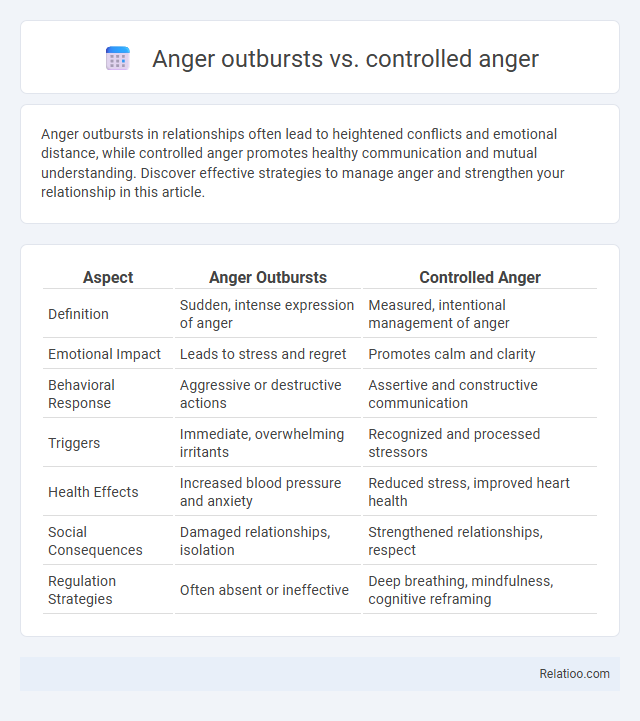Anger outbursts in relationships often lead to heightened conflicts and emotional distance, while controlled anger promotes healthy communication and mutual understanding. Discover effective strategies to manage anger and strengthen your relationship in this article.
Table of Comparison
| Aspect | Anger Outbursts | Controlled Anger |
|---|---|---|
| Definition | Sudden, intense expression of anger | Measured, intentional management of anger |
| Emotional Impact | Leads to stress and regret | Promotes calm and clarity |
| Behavioral Response | Aggressive or destructive actions | Assertive and constructive communication |
| Triggers | Immediate, overwhelming irritants | Recognized and processed stressors |
| Health Effects | Increased blood pressure and anxiety | Reduced stress, improved heart health |
| Social Consequences | Damaged relationships, isolation | Strengthened relationships, respect |
| Regulation Strategies | Often absent or ineffective | Deep breathing, mindfulness, cognitive reframing |
Understanding Anger: Outbursts vs. Control
Anger outbursts are sudden, intense reactions often triggered by frustration or stress, characterized by loss of control and aggressive behavior. Controlled anger involves recognizing emotional cues, managing responses, and expressing feelings in a constructive manner without causing harm. Effective anger management combines self-awareness techniques and coping strategies to prevent outbursts while promoting emotional regulation and healthy communication.
Psychological Roots of Anger Outbursts
Anger outbursts stem from unresolved psychological triggers such as past trauma, stress, or unmet emotional needs, often manifesting as impulsive and uncontrollable reactions. Controlled anger reflects an awareness of these underlying triggers, allowing you to express feelings assertively without harming yourself or others. Effective anger management techniques target these psychological roots through cognitive restructuring, mindfulness, and emotional regulation strategies to transform explosive reactions into constructive responses.
Signs and Triggers of Uncontrolled Anger
Uncontrolled anger often manifests through sudden outbursts, verbal aggression, and physical tension, signaling difficulty in emotional regulation. Common triggers include stress, perceived injustice, frustration, and unresolved conflicts, which escalate responses beyond appropriate levels. Effective anger management involves recognizing these signs early and employing techniques like deep breathing, cognitive restructuring, and time-outs to maintain control and prevent harm.
The Impact of Anger Outbursts on Relationships
Anger outbursts can severely damage your relationships by creating mistrust, emotional distance, and ongoing conflicts, often leading to breakdowns in communication. Controlled anger allows for expressing frustration constructively, promoting understanding and resolution without harming bonds. Effective anger management techniques help you regulate emotional responses, fostering healthier interactions and stronger connections with others.
Controlled Anger: Healthy Expression Strategies
Controlled anger involves recognizing and expressing your emotions in a constructive manner, which prevents destructive outbursts and promotes emotional well-being. Techniques such as deep breathing, mindfulness, and assertive communication enable you to maintain control and respond thoughtfully in challenging situations. Effective anger management strategies focus on transforming intense feelings into healthy expressions, reducing stress, and improving interpersonal relationships.
Emotional Regulation: Techniques for Managing Anger
Anger outbursts reflect an uncontrolled emotional response that can harm relationships and well-being, whereas controlled anger demonstrates the ability to recognize triggers and respond thoughtfully. Effective anger management involves techniques such as deep breathing, cognitive reframing, and mindfulness to help regulate your emotional reactions. Mastering these emotional regulation strategies allows you to express anger constructively, reducing stress and improving communication.
Long-Term Effects: Outbursts vs. Controlled Anger
Anger outbursts often lead to long-term negative effects such as damaged relationships, increased stress, and heightened risk of health problems like hypertension. Controlled anger, regulated through effective anger management techniques, helps maintain emotional balance, improve communication, and reduce the risk of chronic stress-related illnesses. By mastering these strategies, you can foster healthier interactions and enhance your overall well-being over time.
Tools for Transitioning from Outbursts to Control
Effective tools for transitioning from anger outbursts to controlled anger include mindfulness techniques, deep breathing exercises, and cognitive behavioral strategies that help reframe negative thoughts. Utilizing these methods fosters emotional regulation and reduces the intensity of reactive responses, promoting healthier expression of anger. Anger management programs often incorporate journaling and progressive muscle relaxation as additional practices to enhance self-awareness and maintain long-term control.
When to Seek Help for Anger Management
Frequent anger outbursts that result in physical aggression, verbal abuse, or significant relationship strain signal the need for professional anger management help. Controlled anger involves recognizing triggers and expressing emotions calmly, while ineffective anger control can lead to health issues like hypertension and mental health disorders. Seeking therapy or counseling is essential when anger interferes with daily life, causes regret, or leads to destructive behavior patterns.
Building Emotional Resilience for Lasting Change
Anger outbursts often indicate an immediate, unregulated emotional reaction, whereas controlled anger involves conscious regulation and expression of anger in a constructive manner, promoting healthier interpersonal interactions. Effective anger management focuses on identifying triggers, developing coping strategies, and practicing mindfulness to reduce reactive behaviors and foster emotional resilience. Building emotional resilience through sustained anger management techniques leads to lasting behavioral change, improved stress response, and enhanced overall mental well-being.

Infographic: Anger outbursts vs Controlled anger
 relatioo.com
relatioo.com